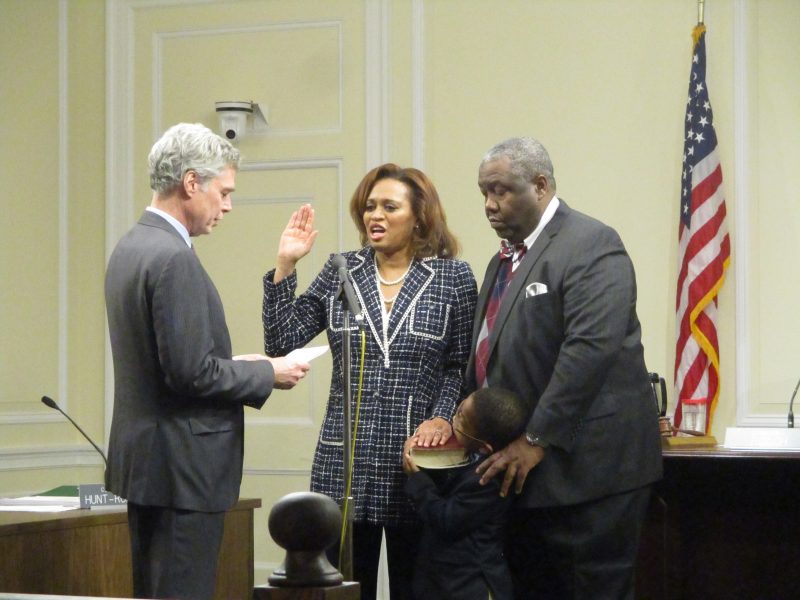White Plains Councilmembers Sworn In, Hunt-Robinson Named Council President

The White Plains Common Council voted unanimously on Jan. 6 to appoint Nadine Hunt-Robinson as its president for the next two years.
Hunt-Robinson took her oath of office at the meeting as did first-term Councilwomen Jennifer Puja and Victoria Presser, who were all elected as a Democratic slate in November.
“It takes a village and I look and I see my village and see how I got here today,” Hunt-Robinson said following her appointment. She thanked her family and friends for their help in “making me the first African-American woman to sit on the Common Council for the City of White Plains.”
Hunt-Robinson said she was part of “the first all women-slate” to be elected to the city’s Common Council.
“I am humbled in the faith that my colleagues have put in me and the citizens of White Plains have put in me to continue to serve the people and to be the council president,” Hunt-Robinson said.
“A wise person knows that there’s something to be learned from everyone,” Puja said following her oath of office ceremony. “I can honestly say that the people sitting in this room and standing are people I’ve learned a great deal from. I’ve learned that, most of all, it takes a village. In our case it takes a city. It takes a city to make change. It takes a city to make a difference. It takes a city to energize and to mobilize and to brainstorm. It takes a city to educate, to empower and to embrace one another and it takes a city to lead.”
“I’m so excited at the opportunity to serve all of White Plains,” Puja said.
Puja said she has been told that she is one of the youngest women to be elected to the Common Council and she wants to inspire girls and women to run for political office.
“It is a great honor to be called upon to serve in government,” Presser said following her oath of office. “I am grateful to the citizens of White Plains for giving me this opportunity.”
Presser said she was dedicating her service in memory of Pauline Oliver, the last Battle Hill resident to serve on the Common Council and her immigrant grandparents and for city residents. “I pledge to give this work everything I’ve got,” she said. “I love White Plains.”
“There’s a lot of work to do,” Presser said. “And if there is one thing we know, it’s that complex challenges rarely have easy answers. But we will see the way through.”
During the meeting, the Council voted unanimously 6 to approve the plan from White Plains Hospital to construct a sky bridge.
The construction of the Longview Sky Bridge is part of the hospital’s modernization project.
William Null, a member of the hospital’s Board of Directors and an attorney representing the hospital, told the Common Council on Dec. 2 the bridge would connect the third floor of the Longview Garage with the second story of the hospital office building and the Center for Cancer Care and span Longview Avenue. The bridge would allow pedestrians to not have to go down to the bottom floor and cross the street, Null said.
The bridge will be about 17 feet above the ground, which will allow trucks to pass under it.
The hospital office building is slated to open in June of next year, Null said.
Also at last week’s meeting the Council voted unanimously to reduce the issuing of bonds for two capital projects by more than $800,000 because the city received grants to pay for portions of the projects.
Hunt-Robinson said the Library Plaza reconstruction project received a $600,000 grant from Westchester County and a $135,000 Federal Block Grant.
Hunt-Robinson also noted the Mattison Park reconstruction project received a $108,500 Federal Block Grant.
Mayor Roach said the Council was de-authorizing previously approved bonds because the city received the grants. With the completion of the Library Plaza project, “We basically added another park to the downtown,” he said.
“It’s not a common occurrence to de-authorize bonds,” Councilwoman Presser said. “It’s a tribute to the city’s skillful fiscal management in the successful pursuit of grants.”
Hunt-Robinson urged city to respond to the upcoming Census count so the federal government receives an accurate count of the White Plains population, which is used for such purposes as providing grants. ”We want to make sure everyone is counted,” Hunt-Robinson said.
